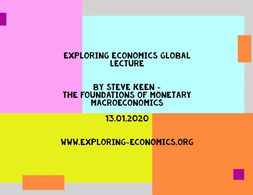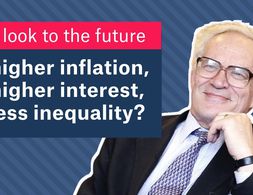234 results
Photo by Alina Grubnyak on Unsplash Networks are ubiquitous in our modern society The World Wide Web that links us to and enables information flows with the rest of the world is the most visible example It is however only one of many networks within which we are situated Our …
A free online course at Masters-level will enable you to understand the past, present and future role of money in society.
Examine what would happen if we were to deploy blockchain technology at the sovereign level and use it to create a decentralized cashless economy. This book explains how finance and economics work today, and how the convergence of various technologies related to the financial sector can help us find solutions to problems, such as excessive debt creation, banks getting too big to fail, and shadow banking.
Economists occupy leading positions in many different sectors including central and private banks, multinational corporations, the state and the media, as well as serving as policy consultants on everything from health to the environment and security. Power and Influence of Economists explores the interconnected relationship between power, knowledge and influence which has led economics to be both a source and beneficiary of widespread power and influence.
This course is an introduction to macroeconomics with a specific focus on the euro area. The theoretical part provides a critical presentation of the two key macroeconomic models: the (neo)classical approach and the Keynesian approach. This allows a comparative analysis of important macroeconomic topics:
- unemployment
- inflation
- government debt and Modern Monetary Theory
- banks and financial crises.
The policy-oriented part discusses the monetary policy of the ECB and the specific challenges for fiscal policy in the euro area. The course also presents other euro area specific topics: Optimum currency area, euro crises, Next Generation EU and Green New Deal.
A comprehensive account of how government deficits and debt drive inflation
Financialization is one of the most innovative concepts to emerge in the field of political economy during the last three decades, although there is no agreement on what exactly it is. Profiting Without Producing by Costas Lapavitsas puts forth a distinctive view defining financialization in terms of the fundamental conduct of non-financial enterprises, banks and households.
Maria Nikolaidi on how Minsky’s theory has been modelled over past decades and how one can use these models in order to analyse contemporary issues such as financial fragility and financial instability caused by climate change.
This content submission has two parts: (1) a link to the post by Wolf Richter on deterioration of US subprime credit card debt and loans, driven in part by the overuse of hedonic quality adjustments in the Consumer Price Index (CPI) used by the US Bureau of Labor Statistics, and (2) to introduce Exploring Economics to the website Naked Capitalism, which is an effort to promote critical thinking through the medium of a finance and economics blog and fearless commentary.
As part of the 2019/2020 Exploring Economics Experience, one of our supporters Prof. Steve Keen gave a presentation to our editorial team. Read more
Exploring Economics Dossier on the economic fallout of the COVID-19 pandemic and the structural crisis of globalization. COVID-19 encounters a structural crisis of globalization and the economic system that drives it, with an uncertain outcome. We asked economists worldwide to share with us their analysis of current events, long-term perspectives and political responses. The dossier will be continuously expanded.
How long the COVID-19 crisis will last, and what its immediate economic costs will be, is anyone's guess. But even if the pandemic's economic impact is contained, it may have already set the stage for a debt meltdown long in the making, starting in many of the Asian emerging and developing economies on the front lines of the outbreak.
In the pluralist showcase series by Rethinking Economics, Cahal Moran explores non-mainstream ideas in economics and how they are useful for explaining, understanding and predicting things in economics.
In this short podcast, Naomi Fowler, the Tax Justice Network's creative strategist, discusses how the laws made by those who profited from slavery and the empire and, the extractive business models of the major financial sector continue to impoverish some of the poorest nations.
Nathan Tankus created this series to introduce people outside of the inner financial circles of professionals, journalists and policymakers to the basic mechanisms and dynamics of monetary policy.
The Money View Symposium was hosted by YSI on 5-7 February, 2021. The Symposium showcased the work of scholars and practitioners that make use of the so-called Money View, ranging from economists to lawyers, politicians and social scientists at large. The symposium aims to illuminate the main tenets of the Money View and to demonstrate its juxtaposition to the mainstream.
This is a new online course at bachelor level. It presents an introduction into macroeconomics with a specific focus on the euro area. The theoretical part provides a critical presentation of the two key macroeconomic models: the (neo)classical approach and the Keynesian approach. This allows a comparative analysis of important macroeconomic topics:
unemployment
inflation
government debt and Modern Monetary Theory
banks and financial crises.
The policy-oriented part discusses the monetary policy of the ECB and the specific challenges for fiscal policy in the euro area. The course also presents other euro area specific topics: Optimum currency area, euro crises, Next Generation EU and Green New Deal.
How exactly are persisting social inequalities and the operations of modern finance connected? Adam Tooze provides a detailed answer to a still relevant problem by focusing on the Great Financial Crisis and the role of the finance industry in the USA.
There was a time when the world still seemed a good and above all simple place for monetary authorities Every few weeks they had to decide whether in view of the latest price developments it would be better to raise the key interest rates by a quarter point or not …
Marx Reloaded is a cultural documentary that examines the relevance of German socialist and philosopher Karl Marx s ideas for understanding the global economic and financial crisis of 2008 09 The crisis triggered the deepest global recession in 70 years and prompted the US government to spend more than 1 …
This syllabus provides an overview of the contents of the course "The Philosophy and Methodology of Economics" at the Duke University
This self-paced free course by Perry Merhling guides you to his "Money View" approach that integrates the fields of economics and finance. The course can easily be understood by people interested people without technical economic knowledge or training as it is primarily a tool for analysis.
Source image New Economic Thinking Youtube channel Some years ago in the aftermath of the great financial crisis GFC of the first decade of the twentieth century Paul Krugman famously remarked that most macroeconomics of the last thirty years was spectacularly useless at best and positively harmful at worst It …
Though apparently siblings from the same family, New Keynesianism and Post-Keynesianism are completely different schools of economic thought. As to why and in what regard exactly, that is what this book is all about. While the former is the official label of the current mainstream in economic research and teaching (rather than neoclassic economics, which would be more apt a term), the latter tries to preserve the original thinking of John Maynard Keynes, but also additional ideas and concepts of all those building on his work.
The world of economics is changing. Years of turmoil in the global economy mean that nothing will ever be quite the same again. This is the starting point and theme of this radically revised Economist books classic.
This book arose from our conviction that the NNS-DSGE approach to the analysis of aggregate market outcomes is fundamentally flawed. The practice of overcoming the SMD result by recurring to a fictitious RA leads to insurmountable methodological problems and lies at the root of DSGE models’ failure to satisfactorily explain real world features.
Microeconomics in Context lays out the principles of microeconomics in a manner that is thorough, up to date, and relevant to students. Like its counterpart, Macroeconomics in Context, the book is uniquely attuned to economic realities. The "in Context" books offer affordability, accessible presentation, and engaging coverage of current policy issues from economic inequality and global climate change to taxes.
The economic crisis is also a crisis for economic theory. Most analyses of the evolution of the crisis invoke three themes, contagion, networks and trust, yet none of these play a major role in standard macroeconomic models. What is needed is a theory in which these aspects are central.
Modern Monetary Theory and Practice: An Introductory Text is an introductory textbook for university-level macroeconomics students. It is based on the principles of Modern Monetary Theory (MMT).
Since the beginning of the twenty-first century, there has been an unprecedented move towards 'rethinking economics' due to the damages generated by the global financial crisis that burst in 2007-2008. Almost a decade after this crisis, policy is still unable to provide all citizens greater wellbeing or at least an encouraging economic future.
Planetary Mine rethinks the politics and territoriality of resource extraction, especially as the mining industry becomes reorganized in the form of logistical networks, and East Asian economies emerge as the new pivot of the capitalist world-system.
The 2007–08 credit crisis and the long recession that followed brutally exposed the economic and social costs of financialization. Understanding what lay behind these events, the rise of “fictitious capital” and its opaque logic, is crucial to grasping the social and political conditions under which we live. Yet, for most people, the operations of the financial system remain shrouded in mystery.
Nous utilisons des cookies sur notre site Web. Cliquez sur Accepter pour nous aider à améliorer constamment Exploring Economics !
































